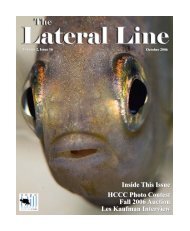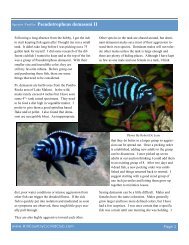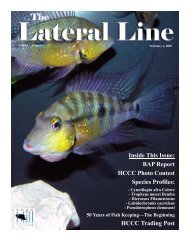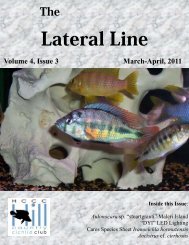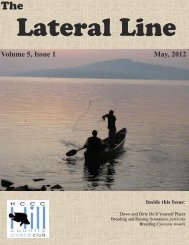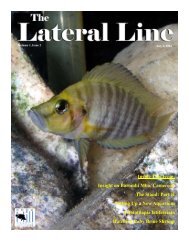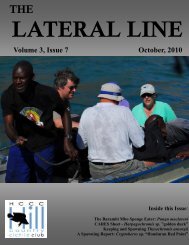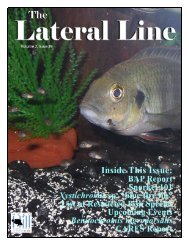December - Hill Country Cichlid Club
December - Hill Country Cichlid Club
December - Hill Country Cichlid Club
You also want an ePaper? Increase the reach of your titles
YUMPU automatically turns print PDFs into web optimized ePapers that Google loves.
8<br />
Keeping <strong>Cichlid</strong>s Outside Year Round—Ghetto Style! - Greg Steeves<br />
After many years of fishkeeping, there comes a time<br />
when adding another tank is just not enough. For<br />
most serious hobbyists I know, the next step is generally<br />
a trip to see and/or collect fish in their natural<br />
habitat. We are truly fortunate here in South Texas<br />
to be able to easily do both. Many of my friends<br />
have gone to Mexico for cichlids and livebearers or<br />
on the Amazon for some exotics. There are even<br />
several friends that have gone to Africa to collect on<br />
the Great Lakes. I have not made those trips yet but<br />
they are in my bucket list. I always admired the<br />
large tank full of Malawians at the San Antonio Zoo<br />
and figured it it could be done there, why couldn’t I<br />
figure out how to keep these fish outside as well.<br />
After a little research it became apparent that the<br />
Zoo had access to better funding than I had. Still,<br />
where there’s a will there’s a way.<br />
The cichlid pond in all its glory.<br />
Now I have to admit that keeping tropical's out of<br />
doors was not a revolutionary idea in any way. My<br />
friend Jeff Johnson had been doing it for years. The<br />
difference is that Jeff had been using the vats he<br />
kept out of doors for growing fish in the warm<br />
weather. When the water turned cooler he either<br />
sold his stock or brought them inside. Jeff had<br />
given me great advice on a number of questions I<br />
had including the “growing” season. He, quite correctly,<br />
advised me that fish could be maintained outside<br />
safely from April 15th to October15th. During<br />
this time there are other potential problems to deal<br />
with such as oak and cedar pollen and animals.<br />
Geographically I had figured that we were close in<br />
latitude to Florida. This is where the majority of<br />
North American tropical fish farms are. There are<br />
only two big differences that we have to be con-



